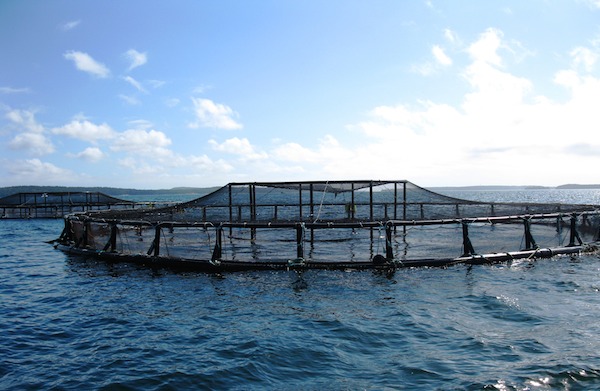
A net pen for fish. Image: NOAA
By Joshua Bender
Capital News Service
LANSING – A proposal to farm fish in Michigan’s Great Lakes may violate the rights of some Native American tribes in the state, according to representatives from several of Michigan’s five Native American tribes.
This new method, called net pen aquaculture, raises fish in enclosed areas within the Great Lakes. Separate bills promoting and banning commercial net pen aquaculture were recently debated in the House committees on natural resources and agriculture.
Opponents of commercial net pen aquaculture in the Great Lakes say the method threatens the lakes’ water quality and fish by creating new opportunities for the spread of disease and invasive species.
“There is no question that net pen aquaculture will cause water quality degradation that could result in an adverse impact on the citizens relying on the fish that live in the water for jobs and food,” said Kathryn Tierney, tribal attorney for the Bay Mills Indian Community.
Proponents say they believe the fish farming method will create jobs while posing minimal threat to the lakes’ water quality and fish.
They include Jim Diana, a University of Michigan professor of fisheries and wildlife who served on a state advisory panel that explored the issue’s potential upsides and hazards.
“We had a disease specialist on our panel, and he didn’t think a well-managed aquaculture farm was a threat. There are some instances where disease has been an issue. It is possible. However our methods have improved substantially for preventing this,” Diana said.
Diana pointed to net pens already operated by the state.
“The biggest net pen system in the Great Lakes now is operated by the (Department of Natural Resources) to catch and rear chinook salmon. I don’t know how you can ban private industry net pen systems but not state ones.”
However some in the tribes argue these state operated net pens are different from the proposed commercial ones.
“They are basically in lieu of a chinook salmon hatchery. The fish are in the pen for a much shorter time frame and the state pens operate on a much smaller scale than the proposed commercial net pens. There is no comparison. It must just be a claim by the aquaculture industry. We are talking apples and bananas difference,” said Tom Gorenflo, director of the Inter-tribal Fisheries and Assessment Program.
The tribes are in a greater position to affect the potential introduction of commercial net pen aquaculture in areas falling under their jurisdiction under the 1836 Treaty of Washington, according to some Native American officials. This treaty grants Michigan tribes occupancy and access rights to the Great Lakes and their neighboring lands.
The rights granted by the treaty were further specified in a 2000 consent agreement among the state, the federal government and Michigan’s five Native American tribes.
“The privilege of occupancy means basically we live here, but what it does not mean is that we don’t evolve. It’s not that we have to live here as we lived 200 years ago. In order for us to continue to exist as we do the environment cannot be degraded. This would infringe on our rights,” Martin Reinhardt, Northern Michigan University Native American studies associate professor, said.
However some tribal representatives urge caution when it comes to viewing net pen aquaculture as a threat to the rights outlined in the treaty and consent agreement.
“We are talking about the abstract since no decision has been made if net pen aquaculture violates tribal rights,” Tierney said. “These are possibilities, not likelihoods, since the language of the legislation has yet to be solidified and passed into law.”
Gorenflo agreed with Tierney’s assessment.
“My feeling is that for the tribes right now, it’s a time to sit back and see what happens. The whole process is in more of an exploratory stage right now and we are really reviewing the information presented to us as we receive it and decisions are made,” Gorenflo said.
However Gorenflo expressed anxiety about the impact the potential expansion would have on the tribes.
“The tribal fishing industry has just been pounded by invasive species and other outside forces. It feels like just sitting back helplessly,” Gorenflo said. “It’s just more of the same, more damage to the lakes. I’d characterize this as a high-risk venture more than anything.”
The loss of fishing opportunities has a negative impact on overall tribal welfare, according to Gorenflo.
“We have five tribes, the state government and the federal government, and the pie has just gotten smaller. It puts greater stress on these previous agreements and promotes political instability within the tribes,” Gorenflo said.
